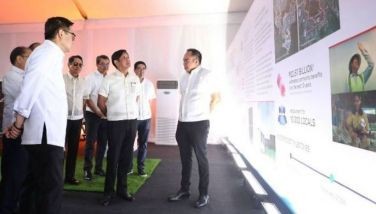Reyes proposes action plan for climate change
Energy Secretary Angelo T. Reyes announced yesterday that the Presidential Task Force on Climate Change (PTFCC) will pursue its action agenda to address global climate change.
Reyes, who is also the PTFCC chairman, said to cope with the threat of global climate change, government must adopt principles that would be aligned with the global action agenda on climate change.
He said there is also a need to come up with a comprehensive and holistic approach to the threat.
The energy chief said this would involve the synchronization of the efforts and programs of all government agencies, including local governments, non-government organizations and private enterprises. He also proposed the creation of a Climate Change Office to be headed by an executive director to handle policy development, project monitoring and evaluation, information and education and administrative support to coordinate the climate change response.
“The core of the proposed response framework hinges on a critical balance between mitigation and adaptation measures,” Reyes said.
He likewise urged Congress to pass a renewable energy law that would increase the share of renewable energy to 20 percent of total energy requirements.
He said the Department of Energy should also come up with a “climate friendly energy supply mix” to lower the volume of gas emissions.
Reyes said that while the Philippines contributes “very little” to greenhouse gas emissions that cause global warming, because of its terrain and location, the country “is highly vulnerable to the effects of climate change.”
“Over the past several decades, nature has given us fair warning in the form of warming and precipitation trends, the frequency and intensity of typhoons, the occurrence of devastating floods and landslides, the alternation of severe El Niño and La Niña events, and the seasonal outbreak of health hazards like dengue and red tide,” he said.
“If these adverse trends worsen, our food and water supply, along with the health, livelihood and settlements of some communities could soon be at risk,” he added.
“In view of the magnitude of the challenge, the country would need to harness financial resources and technology solutions to address the causes and effects of climate change,” he said.
“To carry out mitigation strategies, local communities would need access to climate-friendly technologies to establish low-carbon infrastructure for transportation, energy, agriculture, industry and settlements.
Farmers would need to be introduced to technologies for producing drought-resistant crops.
The task force will facilitate transfer of technology through bilateral, multilateral and regional agreements,” he said.
Thus, he said the task force would have to pursue financing mechanism such as official development assistance funds, market-based incentives, subsidies to lower costs for power generation using solar, wind and other clean technologies, and innovative lending schemes.
- Latest
- Trending



























